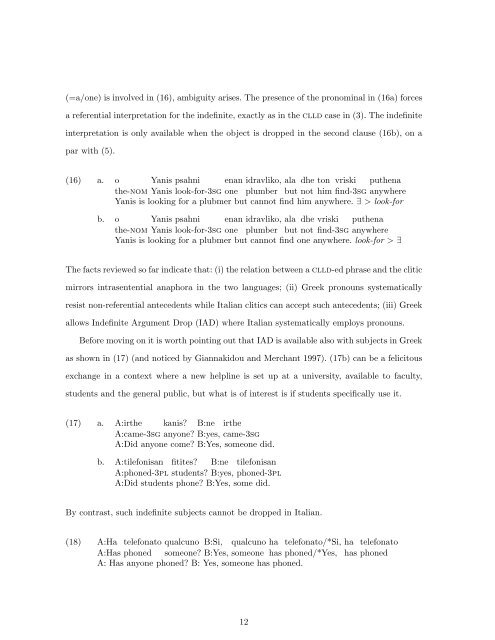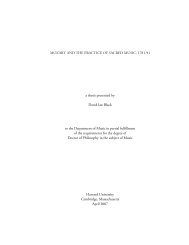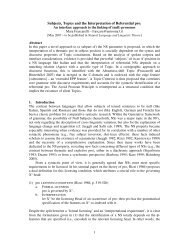draft of November 2011
draft of November 2011
draft of November 2011
You also want an ePaper? Increase the reach of your titles
YUMPU automatically turns print PDFs into web optimized ePapers that Google loves.
(=a/one) is involved in (16), ambiguity arises. The presence <strong>of</strong> the pronominal in (16a) forces<br />
a referential interpretation for the indefinite, exactly as in the clld case in (3). The indefinite<br />
interpretation is only available when the object is dropped in the second clause (16b), on a<br />
par with (5).<br />
(16) a. o Yanis psahni enan idravliko, ala dhe ton vriski puthena<br />
the-nom Yanis look-for-3sg one plumber but not him find-3sg anywhere<br />
Yanis is looking for a plubmer but cannot find him anywhere. ∃ > look-for<br />
b. o Yanis psahni enan idravliko, ala dhe vriski puthena<br />
the-nom Yanis look-for-3sg one plumber but not find-3sg anywhere<br />
Yanis is looking for a plubmer but cannot find one anywhere. look-for > ∃<br />
The facts reviewed so far indicate that: (i) the relation between a clld-ed phrase and the clitic<br />
mirrors intrasentential anaphora in the two languages; (ii) Greek pronouns systematically<br />
resist non-referential antecedents while Italian clitics can accept such antecedents; (iii) Greek<br />
allows Indefinite Argument Drop (IAD) where Italian systematically employs pronouns.<br />
Before moving on it is worth pointing out that IAD is available also with subjects in Greek<br />
as shown in (17) (and noticed by Giannakidou and Merchant 1997). (17b) can be a felicitous<br />
exchange in a context where a new helpline is set up at a university, available to faculty,<br />
students and the general public, but what is <strong>of</strong> interest is if students specifically use it.<br />
(17) a. A:irthe kanis? B:ne irthe<br />
A:came-3sg anyone? B:yes, came-3sg<br />
A:Did anyone come? B:Yes, someone did.<br />
b. A:tilefonisan fitites? B:ne tilefonisan<br />
A:phoned-3pl students? B:yes, phoned-3pl<br />
A:Did students phone? B:Yes, some did.<br />
By contrast, such indefinite subjects cannot be dropped in Italian.<br />
(18) A:Ha telefonato qualcuno B:Si, qualcuno ha telefonato/*Si, ha telefonato<br />
A:Has phoned someone? B:Yes, someone has phoned/*Yes, has phoned<br />
A: Has anyone phoned? B: Yes, someone has phoned.<br />
12
















